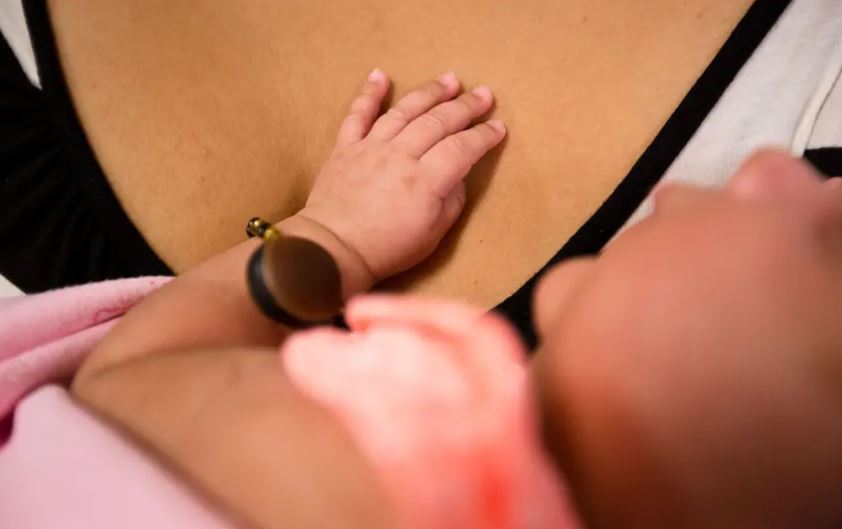Republican state House speaker backs expanding Medicaid to cover mothers for a year after they give birth

[adning id=”33097″]

Republican Texas House Speaker Dade Phelan threw his weight Wednesday behind a bill that would extend Medicaid coverage to mothers for a year postpartum as part of a broad package of proposals meant to increase access to affordable health care in Texas.
The number of reported maternal deaths has increased nationwide in recent decades, and Texas data shows Black women in the state die disproportionately while pregnant or after delivery, from causes like infections, heart problems and mental disorders.
But health experts and advocates point to a fix they say would avert some postpartum deaths: giving low-income moms government-sponsored insurance for a year after delivery. They are kicked off after two months in Texas — though about a third of deaths happen 43 days or more postpartum.
“Childbirth, while a wonderful and almost magical milestone in a woman’s life, can lead to postpartum depression. It can lead to medical crises, premature death, including suicide,” said state Rep. Toni Rose, D-Dallas. “While access to medical resources and counseling can save the lives of mothers, the safety net for those needing assistance disappears 60 days after delivery.”
Rose has proposed a bill, included in the House health care package unveiled Wednesday, that would extend Medicaid to a year postpartum. Lawmakers failed to pass a similar measure in 2019, when the cost of extending coverage was estimated to cost more than $70 million a year.
The announcement comes after Congress passed a pandemic relief bill that incentivizes states to extend it by waiving a lengthy and cumbersome process they would normally have to go through. The federal government has also sweetened the pot for the dozen states, including Texas, that have not more broadly expanded Medicaid to adults who can’t afford insurance but don’t currently qualify for the public program.
Legislation to do that is pending in both chambers, though it was left out of the House’s plan.
Texas has the highest rate of uninsured residents in the country with nearly one in five Texans lacking health coverage. While women can qualify for Medicaid if they are pregnant, a mother with one child would have to make less than $196 a month to be eligible as a parent in Texas, which has the strictest income limits of any state, according to the Kaiser Family Foundation. Medicaid pays for about half of births in Texas.
Texas’ maternal mortality rate is slightly higher than the national average, though that’s based on deaths that happen during pregnancy or within 42 days of delivery. More than 600 women died nationwide in that time frame in 2018, and 277 died 43 days to a year after the end of their pregnancy, according to federal statistics. More than 90 women died in Texas that year — 22 after the 42 day marker used by the government.
Dr. Lisa Hollier, chair of the state’s Maternal Mortality and Morbidity Review Committee, said there are complications like heart disease and mental health conditions that are more likely to happen two months or more after delivery.
“It’s really important that women have access to the full range of services… like emergency room visits, like hospitalizations, that can really help them recover from their heart conditions, for example, or recover from their postpartum depression,” Hollier said.
Advocates have said the state program has almost no network of specialty or mental health providers to deliver those services right now.
The rate of maternal deaths has gained attention nationwide. Experts and studies have found many of the deaths are preventable and that the maternal mortality rate is higher in the U.S. than other high-income countries. The risk is particularly acute for Black and indigenous women, who are two to three times as likely to die than white women.
The past year has been something of an experiment in extending Medicaid coverage for new moms. Because of the pandemic, the federal government temporarily stopped states from kicking new moms off Medicaid — women like Claudia Nungaray.
Nungaray, 30, had used a state women’s health program for her annual checkups, but tried to avoid hospitals or doctors’ visits whenever possible because of the potential cost. When she did need to get glasses or go to the dentist, she paid out of pocket.
“Insurance is very expensive and I couldn’t really afford it,” said Nungaray, who lives in El Paso.
It was a “big relief” to learn Medicaid would cover her prenatal appointments, she said, where her doctors tested her for gestational diabetes and monitored her blood sugar. She was also able to see a counselor and get medication for anxiety and depression that she was diagnosed with during her pregnancy.
In November, she gave birth to a boy she named Kael and spent the next few months in the sleepless haze of new parenthood. She worried what she would do when she lost insurance and is grateful she hasn’t. She’s been able to keep seeing her counselor and going to doctor’s appointments to check on her elevated blood pressure levels.
Through a separate Nurse-Family Partnership program, Nungaray was paired with a nurse who checked on her regularly during her pregnancy and will continue to work with her and Kael for two years.
Doctors and advocates told lawmakers at a March hearing that losing insurance two months after delivery can affect new moms, especially those with limited means. Uninsured women who forgo health care because of the high costs might find out they have underlying health problems at their prenatal appointments but can’t address them before their insurance coverage ends, doctors said.
Dr. Amelia Averyt, a primary care physician at a Houston health center, said she cared for a young mother who had pregnancy-related cardiomyopathy — a heart muscle disease. She was unable to follow up with cardiologists after her Medicaid expired, Averyt said, and instead visited emergency rooms with severe shortness of breath and hypertension.
“Continued care with specialist services could have helped preserve her heart’s functioning. But instead interrupted care contributed to a slow decline to the point where she could not keep up with her baby,” she said.
Adriana Kohler, policy director for Texans Care for Children, said at a legislative hearing this spring that there is a “human toll” if the state does not extend Medicaid coverage to a year postpartum.
Texas moms face complications like cardiac arrest, infection, postpartum depression and extreme blood loss in the year after pregnancy. That can lead to “scary and expensive hospital stays,” more procedures and long-term health issues. Left unaddressed, they can affect an entire family, she said.
“There’s a greater risk of babies dying of SIDS, sudden infant death syndrome. If postpartum depression is untreated, kids are more likely to have ADHD, develop depression or anxiety in themselves, or have behavioral or conduct disorders,” Kohler said.
The House package drew both applause and criticism from some advocates, who said it ignored the “single policy change that would cover the greatest number of uninsured Texans” — expanding Medicaid to cover more low-income adults.
Still, Anne Dunkelberg, associate director at left-leaning think tank Every Texan, said Rose’s bills and others are important and that her organization hopes to see “action soon from the Senate”
“That chamber should not be the place where health coverage progress goes to die,” she said.
ARTICLE COURTESY TEXASTRIBUNE.ORG
[adning id=”33207″]













